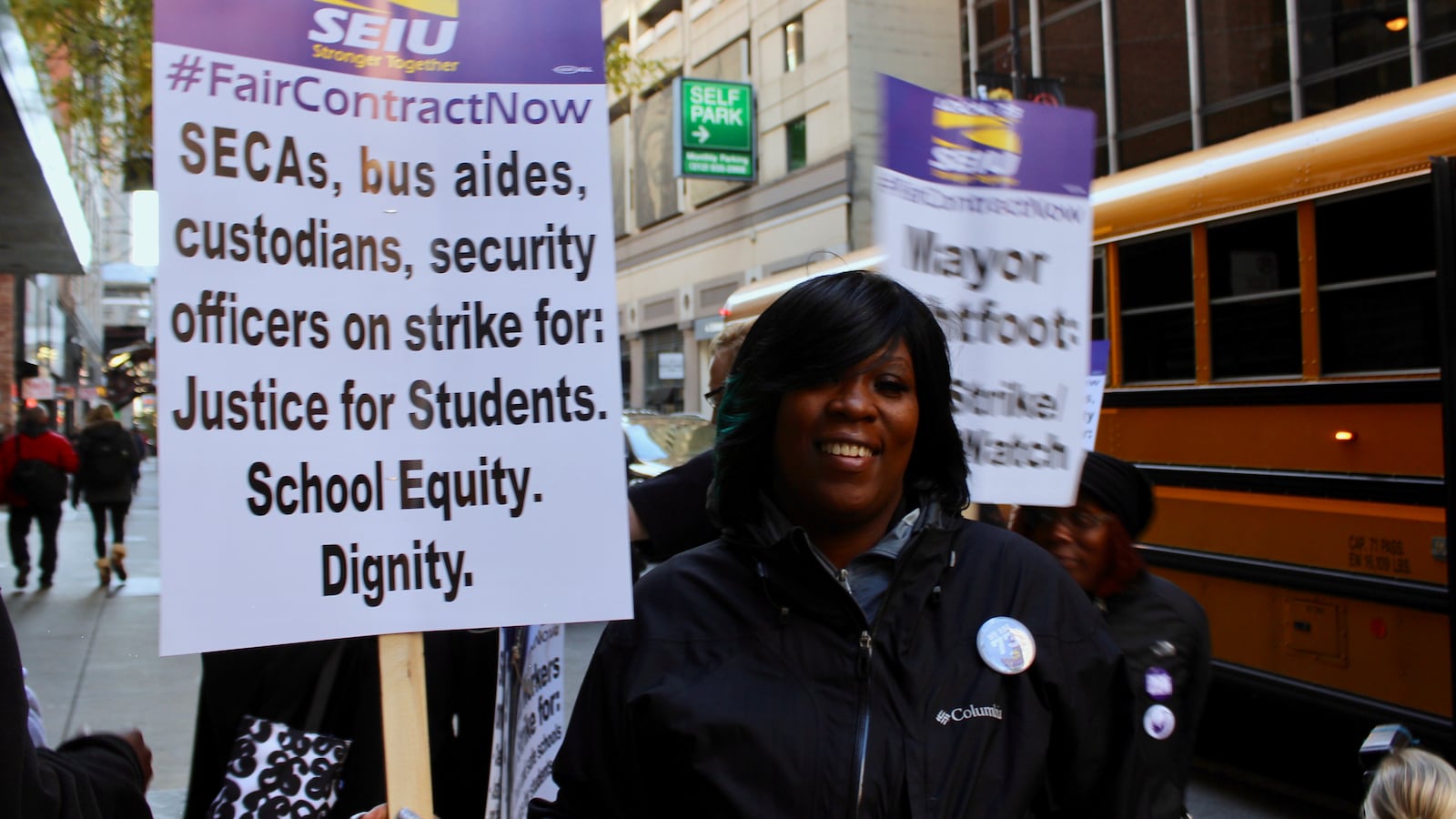Althea McCaskill has been a bus aide with Chicago Public Schools for 10 years and makes about $16,000 a year. No matter how long her 22-mile route from the first student pickup at 108th Street to Disney Magnet Elementary School in Uptown takes, she is paid for four hours.
She rises at 4 a.m. to make it to her school bus by 5:30 a.m. Her work pauses during school hours, but the break from 9 a.m. to 1 p.m. isn’t enough time for other part-time work, and she has gone two years without a raise, she said.
McCaskill and 7,500 members of SEIU Local 73 have been on strike from their jobs at CPS since Thursday, when teachers also walked out. SEIU, which represents CPS bus aides, custodians, classroom assistants, and security officers, says it is still fighting for pay increases that would bring its lowest-paid workers above poverty level, better definition of duties of special education classroom assistants, an end to outside management of custodians by Sodexo and Aramark, and benefits like a paid Christmas break.
The city has offered support workers the same deal it has proposed for teachers: a 16% raise over a five-year contract, additional raises for low-wage custodians and classroom assistants and more paid time off for bus aides. For employees like McCaskill, a 16% raise still would likely have her earning less than $20,000 five years from now.
“That doesn’t show up in your paycheck much,” said Larry Alcoff, chief negotiator for SEIU. “It doesn’t lift you out of poverty.”
SEIU members say they desperately need raises and better working conditions and expressed concern that their negotiations with the city are taking a back seat to those with the Chicago Teachers Union. Negotiations have gone in fits and starts, with a four-day gap at the strike’s start, then a session Monday that the union charged ended when the district left after 12 minutes with no movement toward a deal.
The district denies that it ended Monday’s meeting and said it was SEIU that ended the session.
Since then, the two sides have not scheduled another negotiating session nor made any counterproposals, Alcoff said Wednesday afternoon.
The uncertainty weighs on union members.
“I do this every day, faithfully, for 10 years. Why can’t I get paid what I’m worth?” McCaskill said. The single mom of four, including an adult with special needs, lived in a shelter for months before she was selected in a lottery for low-income housing. Even so, she is often charged a late fee when she can’t pay her rent on time.
She began the school year getting paid for six hours, but that often meant 12-hour shifts, McCaskill said. She would frequently be on the bus for five hours straight without a bathroom break, which McCaskill said was unfeasible for her. Her boss told her there was nothing they could do except cut her hours.
“They tell you to just suffer through it,” she said. “But if anything happens, they throw you under the bus.”
McCaskill joined union President Dian Palmer and other members on a bus that transported them to Wednesday’s downtown rally. McCaskill was visibly stunned as they drove past The 78 megadevelopment near the South Loop. Both SEIU and CTU have repeatedly questioned the city’s use of special taxing districts to lure large real-estate developments.
As Palmer pointed out that The 78 will receive $700 million in tax-increment financing subsidies, McCaskill stared out the window in disbelief.
“I did not know that,” she said quietly. “I can’t afford [to live there]. And to see the things they’re doing, it’s like [saying], ‘We don’t care about you.’ ”
On their way to the rally outside City Hall, bus aides — who make an average $15,600 per year — and custodial staff shared stories of their struggles to make ends meet.
Fellow bus aide Yolanda McGrone was choked up as she described the three months she spent living in her car because she was unable to pay rent for her family, despite working two additional jobs as a home health aide and a medical assistant. She said sometimes she works 13-hour days for the school district but still is paid for less than half that time, as aides are paid by the scheduled route, not by the hours they work. They are not compensated for overtime.
“We work every day at this job, busting our behinds, and we don’t get the respect we are due,” McGrone said, pausing as she broke down. “I can’t take it anymore.”
Being forced to forgo pay is taking a toll. Custodial worker Tashanna Johnson said the strike, now in its fifth day, is threatening her ability to pay rent come November. Her $15.46 hourly wage just barely covers her $1,350 rent in Woodlawn in addition to bills and medication she needs for arthritis and chronic asthma. Sometimes, it’s a choice between paying rent or getting her meds, she said.
Without income for strike days and with an adult son with autism to care for, Johnson said she has seriously considered leaving the strike and going back to work as one of two morning janitors at Morgan Park High School.
“I’m worried about being homeless,” Johnson said. “How am I going to explain this to my landlord? I don’t have a whole check coming. I’m scared.”

